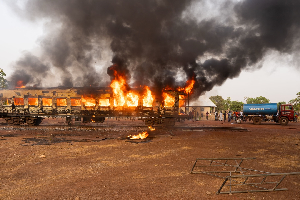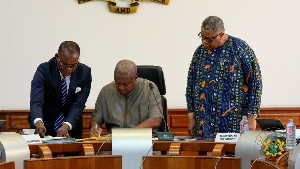– Beijing and Washington Consensuses
By John Amponsah
In Part I of this series, I pointed out that economic and military strength are the two wings with which the Dragon (China) and the Eagle (US) fly on the global stage. Together with economic and military power, technological, social and cultural strength contribute to the prominence of each state. All of these areas are supported by a well educated population. Without a significant number of skilled workers in a country's population, it is difficult to imagine advances in business and industry.
In this article, I intend to explore approaches adopted by China and the US in particular in interacting with Africa in areas of business and economics. At the end of the article, I point out some possible directions I think Africa could take in order to promote our economic interests. It is my hope that this article will initiate a lively discussion.
BRETTON WOODS AND THE “WASHINGTON CONSENSUS”
Economist John Williamson came up with the term “Washington Consensus” in 1989, a policy approach adopted by the International Monetary Fund (IMF) and the World Bank (WB), two organizations that were themselves born out of the Bretton Woods Agreements of July 1944. This policy approach induces (mostly) developing countries to adopt some or all of the following measures which have become the gospel of neoliberalism and of the globalization movement:
Fiscal policy discipline; Redirection of public spending from subsidies; Tax reform; Market-determined interest rates; Competitive exchange rates; Trade liberalization; Liberalization of foreign direct investment (FDI); Privatization of state enterprises; Deregulation and legal security for property rights.
In short these measures make it easier for stronger economies (Western and some Asians ones as examples) to access the markets of weaker ones (those found in Africa, Latin America and parts of the Middle East and Eurasia) while making it more difficult for local industries in developing countries to flourish. The terms and conditions imposed by the predominantly Western-controlled IMF/WB/WTO (World Trade Organization) include dictating to developing countries ideological and even moral policies which sometimes have nothing to do with economic aid!
The sense is that in theory, Western countries claim to want to improve the lot of those in the developing world when in practice policies adopted by countries supporting the “Washington Consensus” only go to show otherwise. The IMF/WB 'help' to developing countries usually involves discouraging local industry growth in place of unbridled “free trade”, which leads to massive imports of good that could be developed locally with the right policies in place. These organizations routinely insist on the removal of state controls which include tariff barriers, currency controls and export subsidies, to be replaced by export zones that ultimately benefit non-local interests. Instead of nurturing industrial and technological potential, the IMF/WB victimized country can end up developing into a “banana republic”. The next section sheds more light on this claim.
THE BAD SAMARITANS HAVE “KICKED AWAY THE LADDER!”
“Any Nation which by means of protective duties and restrictions on navigation has raised her manufacturing power and her navigation to such a degree of development that no other nation can sustain free competition with her, can do nothing wiser than than to throw away these ladders of her greatness, to preach to other nations the benefits of free trade” – Friedrich List (1789 – 1846)
It is interesting to note that much of the West (the US and UK in particular) did not follow the same development route that they are now selling to developing nations as the “free trade” gospel. Dr Ha-Joon Chang (www.hajoonchang.net/) of Cambridge University has shown in his books “Kicking Away the Ladder – Development Strategies in Historical Perspective” and “Bad Samaritans – The Guilty Secrets of Rich Nations & The Threat to Global Prosperity” that the conditions expected of economically developing nations by institutions like the IMF and the WB were not the same conditions adopted by most Western countries during their earlier development phase.
Today's developed countries (with very few exceptions due to particular circumstances) in just about every case started off their nascent economies with many protectionist policies that helped nurture those economies. What is more – The "Asian Tigers" (China, Japan, Korea and Taiwan) also adopted tariffs and other protectionist measures to support their industries as they rose to their current height.
Apparently, US President Grant is known to have said in the 1870s that, "within 200 years, when America has gotten out of [tariff] protection all that it can offer, it too will adopt free trade". Well we know now that President Grant was correct in his prediction!
This is not to say that free trade does not work or is not a viable economic policy. It is more so that free trade as an economic principle should be practised in a most appropriate fashion, for instance between countries of comparable economic strength. As it stands, free trade policies promoted by the IMF/WB/WTO in the current world economic stage favour stronger countries while making weaker countries even worse off. That almost sounds like a zero-sum game.
Dr Chang's position is very relevant to Africa at its current stage of development. These are not simply the ideas of an isolated intellectual. Globalization has many prominent critics, including even 2001 Nobel Laureate in Economics and former World Bank chief Dr Joseph Stiglitz who wrote the worthy book “Globalization and its Discontents” and who has written supporting comments on Dr. Chang's work.
More recently, Ghanaian economist Dr John Kwabena Kwakye of the Institute of Economic Affairs Ghana presented his paper 'Mitigating the costs of “Washington Consensus” Policies: Tidbits for Ghana and Other African Countries' where he also supports the idea of adopting a broad range of measures tailored to Ghanaian and African markets, such as diversifying domestic production, targeting specific state subsidies and using selective trade “protections” among others (there are seven recommendations in all, see sections 3.1-3.7 of the publication below). In essence, what Dr Kwakye is saying is not dissimilar to what Dr Chang has said in his publications. Dr Kwakye 'urged Ghana and African countries to use both tariff and non-tariff instruments to “shield” their industries from undue competition from imports and allow them to flourish.' (see the peacefmonline article below) (www.ieagh.org/index.php/publications/monographs/101-mitigating-the-costs-of-the-washington-consensus; business.peacefmonline.com/news/201106/46436.php)
GHANA: NDC AND NPP ON TARIFF BARRIERS
Curiously the NPP eliminated food tariffs in 2002, causing farmers in the north to lose their livelihood and children to drop out of school because their parents could not pay their fees. The following article covers this subject: www.ghanaweb.com/GhanaHomePage/NewsArchive/artikel.php?ID=79568 ; www.batsanakotey.com/component/content/article/1-latest-news/345-poultry-farmers-battling-to-survive-.html)
I do not know why Kufuor's government chose to do this however I suspect that was a condition imposed by the IMF/WB/WTO group of neoliberal/free trade promoters. It could also be that at the policy level, the NPP prefers stronger trade liberalization over protectionism. This seems to be exactly what the late former Minister for Finance and Economic Planning, Kwadwo Baah-Wiredu, said in the document entitled “First Business Roundtable with Government of Ghana” (see points 3, 4 and 15 of this document: www.mofep.gov.gh/documents/business1.pdf).
It appears the NDC reversed this policy decision which came to be known in legal circles as the “poultry farmers case”. Ghana's current government has now included tariff barriers in its policy to protect local livestock and poultry produce: (www.ghanaweb.com/GhanaHomePage/features/artikel.php?ID=173225 ; foodsecurityghana.com/2011/12/29/ghana-to-ban-importation-of-poultry-products/).
What emerges from what we have discussed so far is that without some level of state-imposed tariffs in policies of developing countries, local industries ran the risk of perishing. The textiles industry in Ghana and in Togo has declined due to an influx of cheap textiles from China. A similar event occurred in Zambia where 140 local clothes making companies were reduced to 8, after eliminating taxes as a result of IMF policies.
THE “BEIJING CONSENSUS”: CAN CHINA DELIVER A CREDIBLE ALTERNATIVE?
The “Beijing Consensus”, in contrast to the “Washington Consensus”, is the approach China seems to be adopting in its dealings with the developing world, that is, Africa, Latin America and parts of the Middle East and Eurasia. This term was first coined by Joshua Cooper Ramo in a 2004 paper:
“To the degree China’s development is changing China it is important; but what is far more important is that China’s new ideas are having a gigantic effect outside of China. China is marking a path for other nations around the world who are trying to figure out not simply how to develop their countries, but also how to fit into the international order in a way that allows them to be truly independent, to protect their way of life and political choices in a world with a single massively powerful centre of gravity. I call this new physics of power and development the Beijing Consensus. ”
Both Westerners and Africans are in the process of figuring out what China is really up to in Africa. China has however provided the world with China's Africa Policy (published in January 2006), just before the Beijing Summit of November 3, 2006 during which 48 out of 53 African states were represented and 41 African heads of state showed up. With this summit, China showed the world that it is serious about doing business with Africa. Between 2000 and 2007, China increased trade in Africa from $10 billion to $50 billion. The Chinese have 38 or more embassies out of the 48 sub-Saharan countries. Since 2008, Angola has been producing more crude oil for China than Saudi Arabia. The list goes on an on.
Yet there are some significant differences in the way the “Beijing Consensus” organizations do business to the way the “Washington Consensus” organizations operate. With the Chinese, all operations are managed by the state. Chinese banks are state-owned. Chinese companies are state-owned and state-backed. The Executive Bureau of International Economic Cooperation which operates under the Ministry of Commerce of the People's Republic of China deals with loans and is akin to the “Washington Consensus” IMF. China also has massive state-owned banks such as China Development Bank and China Exim Bank both key to development projects in the developing world. These two banks are the “Beijing Consensus” version of the World Bank.
China is ready to do business with Africa but what has been the result? Although China brings development opportunity to Africa without the strings that come with “Washington Consensus” organizations, there are other stark challenges that Africa still faces with China in the picture. Chinese companies can be very competitive in a way that can damage local enterprise when their goods and services flood African markets unchecked. Local workers are not always chosen for jobs that they could easily do (such as hiring a Chinese worker instead of a local Zambian to push a wheel cart). In cases where local workers are chosen, their working conditions do not always meet acceptable standards. Chinese companies do not always follow the environmental rules (or any rules for that matter) of their host countries and sometimes contracts are not executed to the highest standard.
So the arrival of the Chinese is not necessarily going to make Africa a better place. We as Africans need to do more to ensure that we are neither taken advantage of by the “Washington Consensus” group nor the “Beijing Consensus” group or any other powerful foreign group for that matter (EU, India, Russia, Brazil etc). What can be done? We need to have effective and well thought out policies in place! That is the subject of the final section of this article.
AFRICA – WHAT CAN BE DONE?
On the one hand we have the West imposing different levels of conditionalities (economic, ideological, moral) on their assistance and on the other hand we have China, ever ready to do business in Africa but if unchecked, running the risk of going overboard in areas of environmental degradation, corruption, fair practice, fair employment terms and respect for human rights.
So what do we need to do in Africa? A number of experts (Dr Fantu Cheru, Dr Robert Rotberg among others) all seem to agree on one point. For Africa to move forward, we need to get organized. We need effective economic policy. Without effective policy, the larger blocs will always seek to take Africa for a ride.
Africa needs to make use of various “pillars” of the African Economic Community. Empower ECOWAS, empower SADC, EAC, ECCAS. Make and implement policies that are tailored to the African market. Neither strict protectionism nor complete trade liberalization will work for the specific needs of Africans. Instead, choosing targeted policy measures specific to our region and to our stage of development such as those suggested by Dr Kwakye in his article above is the way forward for Africa to realise its economic potential. Ensure that policies are effective not only on the national level but more importantly on the sub-regional level. Let us Africans deal with East, West, Latin America, the Middle East and everyone else from a stronger standpoint of organised economic sub-regions. From this step we can start contemplating a united African Economic Community.
Opinions of Sunday, 19 February 2012
Columnist: Amponsah, John














